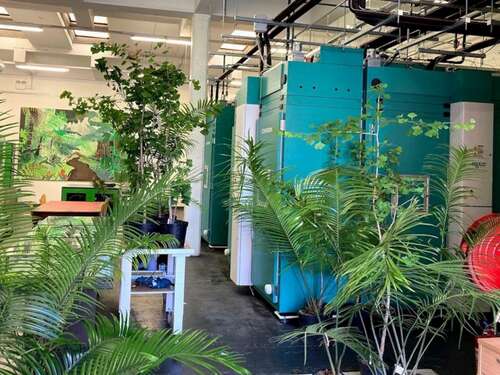
The VAL lab at Trinity is a new state-of-the-art facility that will enable researchers to conduct experiments under past and future climate conditions.
Trinity College Dublin (TCD) today (6 February) unveiled the long-awaited Variable Atmospheric and Light (VAL) laboratory to study the effects of climate change in precisely controlled conditions.
Originally funded by the Science Foundation Ireland research infrastructure scheme and by TCD in 2015, a long manufacturing process and Covid-19 delayed the project until now. The VAL lab includes six walk-in chambers that will enable teams of researchers from various disciplines to run experiments under specific light, atmosphere and climate conditions.
Prof Jennifer McElwain leads the Plant/Climate Interaction Lab in the School of Natural Sciences at TCD. She said the VAL lab will give researchers the opportunity to “pose a plethora of climate-related questions under varying conditions”.
“This fine-tuning control means we can simulate current conditions pretty much anywhere in the world and bring them to the lab in Trinity, as well as travelling back and forward in time when conditions were or will be different.”
Travelling to ancient climates
McElwain and her team are working on the European Research Council-funded Terraform project to study how plants made our planet habitable over millions of years. Using the VAL lab to simulate ancient climate conditions, they will conduct experiments on fossilised plants from around the world.
“The results from these experiments will give us a much greater degree of confidence in predicting what will happen under varying future climate scenarios, which promises to help us plan ahead better for what is to come,” McElwain said.
McElwain was part of the multidisciplinary expert team that put together the recently published Environmental Protection Agency climate report.
Ireland’s Climate Change Assessment (ICCA) is a four-volume report that provides a comprehensive scientific analysis of the current state of knowledge and action in relation to the climate crisis in Ireland.
EPA director general Laura Burke said the report “represents a major contribution to our understanding of the impacts and challenges experienced and posed by climate change in Ireland”.
“It reinforces the need for Ireland to pick up the pace of action to reduce greenhouse gas emissions and adapt to our changed and future climate.”
Back to the future
Researchers from Maynooth University, led by Dr John Devaney, will use the VAL lab to investigate future climate impacts on native Irish woodlands by modelling climate conditions for 2050 and for the end of this century.
The Ancient Woodlands Ireland project is funded by the Department of Agriculture, Food and the Marine and will complete an all-island inventory of native woodlands to identify priority sites for conservation and restoration.
Thrilled to be leading the @agriculture_ie and @NPWSIreland funded Ancient Woodlands Ireland project. Our project is a collaboration between @MaynoothUni, @teagasc, @DkIT_ie, and @WoodlandTrust in Northern Ireland https://t.co/jlwbVlrldD
— John Devaney (@johnldevaney) December 13, 2023
No time like the present
Dr David McCluskey from the School of Physics in TCD, alongside a team of energy science researchers, will use the VAL lab to test the efficiency of newly designed solar panels in a South African climate.
Dr Ruth Freeman, director of Science for Society at SFI, said the VAL lab presents an opportunity to “spearhead pioneering research in climate change”.
“The [SFI] Research Infrastructure programme is designed to support state-of-the-art equipment to drive excellent and high impact research and facilitate transformative collaborations such as the VAL laboratory.”
Find out how emerging tech trends are transforming tomorrow with our new podcast, Future Human: The Series. Listen now on Spotify, on Apple or wherever you get your podcasts.

